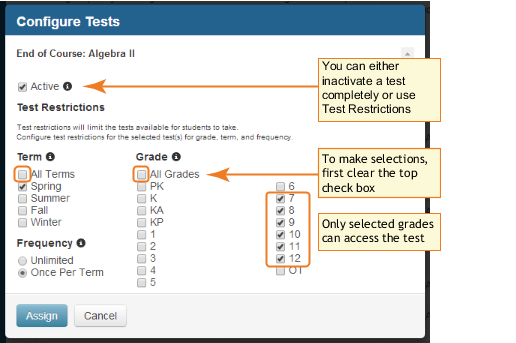
Your district has the option to define which tests are appropriate for students, such as which grade level(s) may take a test. When this feature is set up, then tests that are inappropriate will be either hidden or blocked within the Manage Test sessions area of MAP. This reduces the risk of students taking the wrong test.
Required MAP role: System Administrator or District Assessment Coordinator
Example Restrictions
The following table shows example restrictions and what would happen.
| Example | Can Assign Test? | Can Confirm Test? |
|---|---|---|
| Term Restriction = Spring Only | ||
| During spring | Yes | Yes |
| During winter | No | No |
| Grade Restriction = 7-12 Only | ||
| Students in grades 7 to 12 | Yes | Yes |
| Students in K to 6 | No | No |
| Frequency Restriction = Once Per Term | ||
| First time taking test | Yes | Yes |
| Second time | Yes | No |
Note: As highlighted above, there are situations where a restricted test still appears available, but cannot be confirmed.
Here's another example: Suppose that MAP Growth K‑2 tests have been restricted to grade 2 only. It is possible that those tests still appear available if the proctor selected a mix of both grade 2 and 3 students. However, the test assignment would be automatically repressed for those grade 3 students.
Basic Setup
To change settings, open Modify Preferences > Modify Tests, select one or more tests, and click Configure Test Settings. In the Configure Tests window, select any combination of check boxes listed.

Notes:
- Active— Enables or disables a test for all students in all circumstances. The corresponding subject is also inactivated in the DesCartes reports. Leave tests active if you want teachers to access DesCartes reports for a given test subject.
-
Frequency = Once Per Term— With this setting, after valid completion of a test, the student can no longer take it again for the remainder of the term.
Suspended tests can be completed, if within 28 days. After 28 days, if a proctor tries to resume the test, a confirmation prompt appears, forcing the proctor to choose Do Not Confirm. At that point, the test becomes terminated.
Terminated tests, like completed tests, count toward the frequency restriction by default. (However, your district may have asked to implement MAP differently so that terminated tests do not apply to this restriction.) If needed, there is a way to override this restriction.
Frequent Questions for Test Restrictions
It is possible to override the restriction imposed when Frequency is Once Per Term. (For example, you could override the restriction for a test mistakenly terminated, because by default a termination counts toward the "once per term" limit.)
For details, see Overriding a Test Restriction.
The most likely scenario is that the test was terminated, either by the proctor (for example, the student began the wrong math test) or because the suspended test was not completed within 28 days.
By default, terminated tests count the same as completed tests when MAP applies the "once per term" frequency restriction. If needed, see Overriding a Test Restriction.
Suspended tests can still be completed in this situation (as long as it fits within the 28-day limit for completing suspended tests).
Once you limit the test settings by grade, those students with suspended tests who would fall under the new grade restrictions can no longer complete the test. If needed, first arrange for students with suspended tests to complete testing.
No. If the restriction was not in place when a student began a test, then that test event does not count toward the Once Per Term limit.
Related Tasks...
Displaying Student Score After Testing
back to top >>